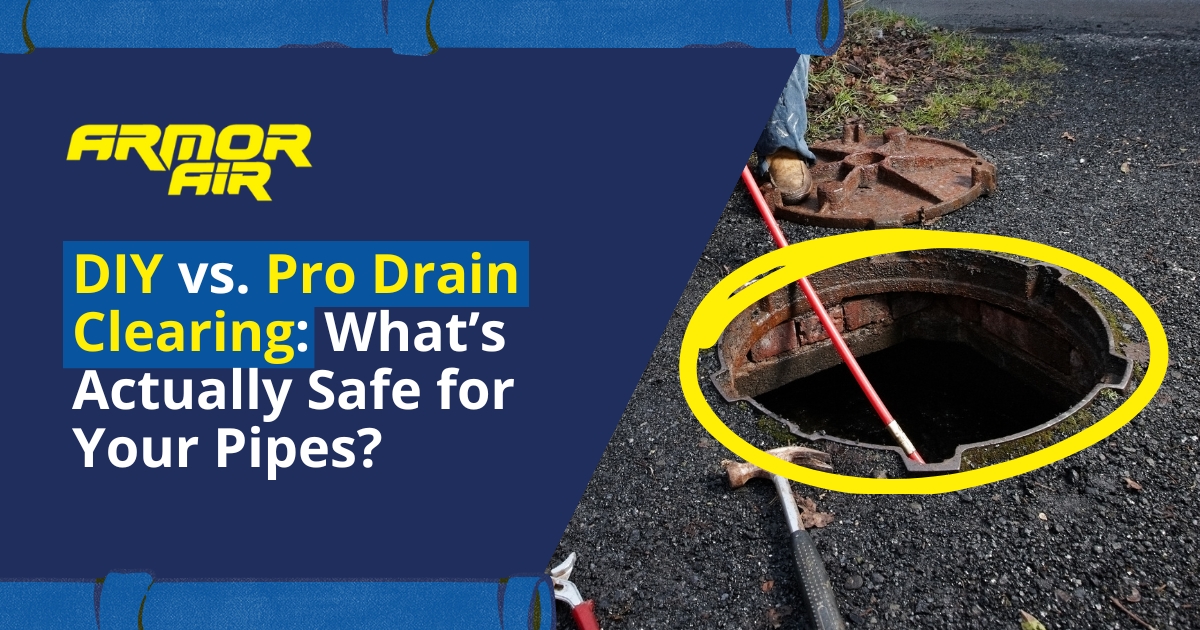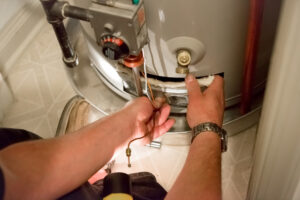Closed: Sun for God + Family time
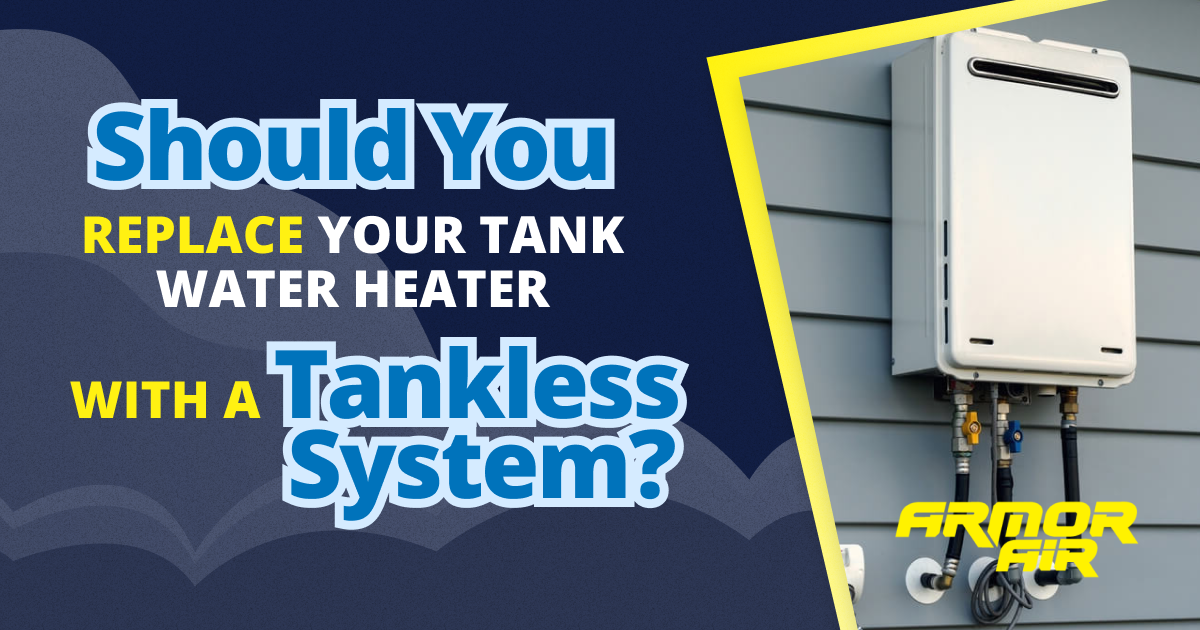
Should You Replace Your Tank Water Heater with a Tankless System?
Whether your tank water heater is nearing the end of its lifespan or simply not meeting your household’s needs, you may be wondering whether upgrading to a tankless water heater is worth the investment. Unlike traditional models that store a limited amount of water in an insulated tank, these systems provide on-demand hot water whenever you need it. But while they offer many benefits, it’s important to consider your budget, lifestyle, and climate to determine if it’s the right fit for your home.
In this guide, we’ll walk you through the benefits of a tankless water heater vs. a tank model, how each system works, and how to determine the right fit for your home.
How Traditional Tank Water Heaters Work
Traditional tank water heaters store heated water in an insulated tank for household use. When someone in your home uses some of the stored hot water, cold water enters the tank through a drip tube at the bottom. A gas burner or electric heating element then heats the water, which rises to the top for the next use. The tank’s insulation helps keep the water warm until it’s needed, but continues to consume energy to maintain the temperature.
What Is a Tankless Water Heater?
A tankless water heater heats water on demand, offering a continuous supply. Rather than storing and heating water in a tank, tankless models only heat water when it’s needed. When you turn on a hot water tap, cold water flows to the unit and passes through a power burner that warms it for use. Once you turn off the tap, the burner shuts off and stops using energy until you turn it on again.
Upfront Cost vs Long-Term Savings
While the cost of tankless water heater installation is higher than that of traditional tank models, they offer long-term savings due to their lower energy consumption and longer lifespan. Tankless models only use energy when hot water is in use, unlike traditional models that continuously use energy to maintain the water temperature in the tank. When you switch to a tankless water heater, you’ll see a noticeable drop in energy bills.
Tankless water heaters also offer a longer lifespan than tank systems, which typically last between eight and 12 years. With proper maintenance, your tankless water heater should last for up to 20 years, reducing replacement costs and providing long-term reliability for your home.
When Is the Right Time to Replace Your Traditional Water Heater?
If your tank water heater is over eight years old or showing signs of wear and tear, it may be time to consider upgrading your system. Some of the top warning signs your unit is nearing the end of its lifespan include:
- Leaks: If you notice water leaking out of the base of your tank, it’s often a sign that the inner lining is corroding and beginning to fail.
- Rusty or discolored water: A reddish or brown tint in your water is often due to a rusting tank, which can affect the quality of your water supply.
- Inconsistent heating: If you’re constantly experiencing cold showers or water temperature fluctuations, your heater may be struggling to operate effectively.
- Rising energy bills: Wear and tear can cause your water heater to require more energy to operate, resulting in higher monthly bills.
- Strange noises: When sediment builds up at the bottom of the tank, you’ll often hear popping, banging, or cracking sounds while it’s in operation.
If you notice any of the above signs, contact a trusted water heater company near you. Ignoring the signs of a failing water heater can lead to unexpected breakdowns, poor water quality, and costly repairs.
Tankless vs Tank: Which One Is Right for You?
If you’re ready to upgrade but unsure whether a tank or tankless water heater is right for your home, consider the following:
- How much water do you use? Larger households that use significant amounts of water often benefit from switching to a tankless water heater.
- What’s your budget? Tank water heaters are more budget-friendly upfront, while tankless models offer long-term savings.
- What are your energy efficiency goals? Tankless water heaters offer greater energy efficiency, helping to reduce your usage and utility bills.
- How much space do you have? Tank water heaters take up significantly more space than tankless systems.
- What’s your climate like? Tankless systems require more energy to heat water in colder climates, operating most efficiently in warmer regions.
- What kind of maintenance can you commit to? Tankless water heaters typically require less maintenance than traditional tank systems, which necessitate regular flushing.
Why Professional Installation Matters
When the time comes to upgrade your water heater, always book a replacement with a reputable water heater company, such as Armor Air. Experienced technicians have the skills, tools, and expertise to safely and securely install your system for lasting efficiency. They’re also familiar with local codes, ensuring your water heater is appropriately sized and installed for safe operation and compliance.
Water heater pros can also help you determine which water heater is right for your home, taking into account your household size, water usage, and budget. They’ll assess your needs, inform you about the pros and cons of a tankless vs. tank system, and recommend a model that provides reliable hot water for years to come.
Call Armor Air for Water Heater Replacement!
Whether you’re ready to upgrade to a tankless water heater or want to learn more about which system is right for your home, the team at Armor Air is here to help. Our water heater experts will help you find and install the best system for your needs, providing honest recommendations and efficient installation. With service from our team, you can trust that you’ll have dependable hot water when you need it most.
Call us or book online to schedule water heater service in Indianapolis and surrounding counties. We also offer expert plumbing, heating, and cooling services that keep your home comfortable year-round.
Recent News
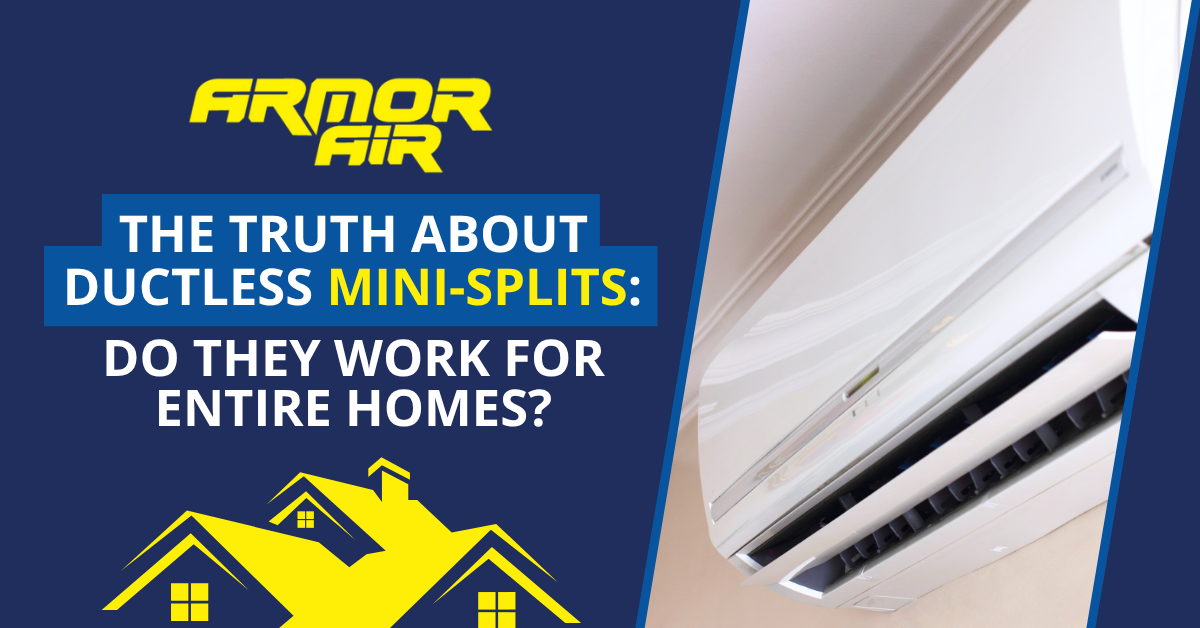
The Truth About Ductless Mini-Splits: Do They Work for Entire Homes?

Top Benefits of Installing a Water Softener in Your Home
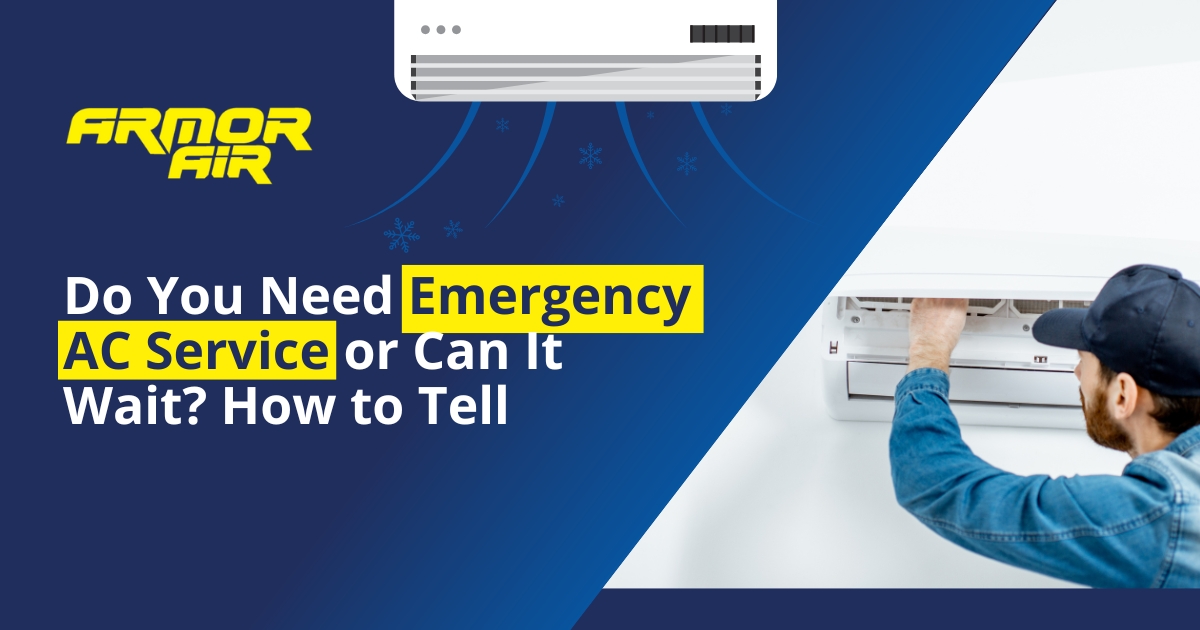
Do You Need Emergency AC Service or Can It Wait? How To Tell

How a Smart Thermostat Can Save You Money This Summer

How to Beat the Humidity: Dehumidifier Benefits in Indiana Homes

When Should You Upgrade To a Smart Thermostat?
